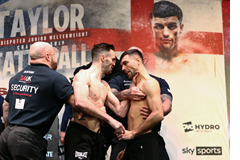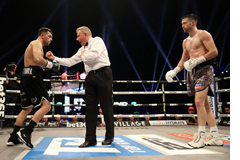Corruption in Boxing: Catterall vs.
Taylor Controversy Sparks Investigation
Do the various athletic commissions governing combat sports across the globe serve as little more than proxy fronts for the same organized crime syndicates who have always controlled boxing? In the latest developments surrounding the controversial decision between Jack Catterall and Josh Taylor, the British Boxing Board of Control (BBBofC) has announced via a March 10, 2022 Twitter social media release that they have investigated themselves and concluded that the scorecard of judge Ian John-Lewis “did not affect the overall results of the contest” despite the fact Josh Taylor won by split decision.
However, in what is tantamount to a slap on the wrist in order to appease the public and give the investigation some semblance of legitimacy, the BBBofC went on to state that they did in fact take issue with John-Lewis’s margin in explaining why they took the action of downgrading the BBBofC appointed judge from an “A Star Class to an A Class Official.”
 In addition to these punitive measures, the British Boxing Board of Control went on to announce that they took the essentially meaningless step of having “contacted the WBO, WBC, IBF and WBA supporting Jack Catterall to be made mandatory challenger for each or all Championship Sanctioning Bodies.” The BBBofC essentially attempting to sweep this entire thing under the rug with a nod, wink and a smile in hopes the mounting public backlash begins to subside.
In addition to these punitive measures, the British Boxing Board of Control went on to announce that they took the essentially meaningless step of having “contacted the WBO, WBC, IBF and WBA supporting Jack Catterall to be made mandatory challenger for each or all Championship Sanctioning Bodies.” The BBBofC essentially attempting to sweep this entire thing under the rug with a nod, wink and a smile in hopes the mounting public backlash begins to subside.
“Amidst the ongoing investigation surrounding the widely criticized outcome in the Josh Taylor-Jack Catterall junior welterweight championship fight is the question of why two of the judges were there at all,” writes BoxingScene.com’s Jake Donovan in his March 8, 2022 article titled, “Taylor-Catterall: WBO Previously Objected BBBofC Appointment of Judges Lewis and Loughlin.” According to the report, “BoxingScene.com has learned that the WBO—who ordered the mandatory title fight—objected to the appointment of Loughlin and John-Lewis, neither of whom are WBO-certified.”
Donovan goes on to write that, “Representatives from the WBO did not return a message from BoxingScene.com seeking comment, though it has been learned that the objection was not only addressed with the BBBofC on January 26—one day after all were informed of the board's officials selection—but done so in the presence of all the sanctioning bodies involved in the fight.”
With Taylor being the undisputed WBC, WBA, WBO and IBF junior welterweight champion, the fact that all of the sanctioning bodies were present for the objection of two of the three judges is significant. And the controversy doesn’t end with the judges either, according to the report referee Marcus McDonnell’s performance and subsequent point deductions during the contest have also come under scrutiny.
“While fans - and even some in the media - are quick to chalk up any scoring dispute as a conspiracy," explains Donovan, "there so far lacks evidence of a smoking gun."
An important distinction to make and the responsible thing to report, the fact remains that Donovan’s summary of events alone perfectly attests for the need to have an investigation, which is something we here at the MMA Press Room may have very well been alone in the combat sports industry in having called for. In fact, the MMA Press Room openly called out Sir Lindsay Hoyle during the aftermath of the fight; who as we are about to discover is someone who has ultimately played a pivotal role in the launching of a criminal probe in order to further investigate the peculiar nature of the nights main event.
"I have to question why the judges got it so wrong? I have already sent a letter to the police," Sir Lindsay Hoyle, Jack Catterall's MP in Chorley, told Sportsmail,” according to a March 8th, 2022 Sky Sports article titled, “Josh Taylor vs Jack Catterall scoring referred to police by the Speaker of the House of Commons.”
"’Everyone is disgusted by what's happened,’ said Hoyle. ‘It brings the sport into disrepute.’”
 Whilst a criminal probe into the Catterall-Taylor fight is a step in the right direction, investigators will likely face an uphill battle in attempting to prove any sort of impropriety in a court of law due to in large part the sophisticated nature in which these rackets operate. The corruption so entrenched in boxing that those involved in the fight fixing game have become virtual experts in exploiting the legal loopholes necessary to stay just on the periphery of prosecutorial descretion.
Whilst a criminal probe into the Catterall-Taylor fight is a step in the right direction, investigators will likely face an uphill battle in attempting to prove any sort of impropriety in a court of law due to in large part the sophisticated nature in which these rackets operate. The corruption so entrenched in boxing that those involved in the fight fixing game have become virtual experts in exploiting the legal loopholes necessary to stay just on the periphery of prosecutorial descretion.
“The way you fix fights varies greatly,” explains the manager of former heavy champion Leon Spinks, Charles Farrell, in the award winning 2016 documentary “Dirty Games – The dark side of sports.” According to Farrell, a recognized expert on fight fixing who was involved in fixing hundreds of fights, “You fix fights by buying judges. That’s, you know, that’s one easy way to do it. You fix fights by having the referee working for you, so that if there is any way that the ref can stop the fight in your guy’s favor, he does.”
“One of the things that you’re cognizant of when you are fixing fights,” explains Farrell to filmmaker Benjamin Best, “is that you’re doing something illegal. Something that theoretically, can wind you up, you know, wind you in jail and get people angry at you. So, you never really say anything. You know... nothing that’s culpable.”
“So, there’s a code. And if you’re in boxing for a while you know the code. Everybody knows the code. You will go into a gym, where there is either a trainer or a manager and you’re looking for somebody your guy can beat. This is how these guys make their money. And it’s interesting that people who lose in boxing, generally speaking if they’re professional losers, can make more money than winners,” explains Farrell. “Winning cost money. Losing makes money. Now that’s not true obviously at an elite level, but at almost every other level it’s the case”
“So, what you do is you say that ‘I’ve got a guy and he is looking for work.’ Looking for work is the first. Okay, so it means that he needs to win. You know... and you want to keep him busy. The response to that is that ‘I’ve got somebody’ and generally the second phrase to that is ‘but he hasn’t been in the gym too much.’ Okay, so the subtext there is he’s not in good shape,” explains Farrell. “So, you’re honing in on where this thing is going to go.”
“So, you say 'Well, that’s okay. I’d like that guy to get in a few rounds.' That means it's going to be a knockout," explains Farrell. "At which point he goes ‘Well, you know, okay. I can do that, but really my guy isn’t in shape to go three or four.’ That’s okay.”
“So, you just fixed the fight. Nobody's done anything illegal, nobody's done anything where they’ve come out and stated anything explicitly. But that’s a done deal and you get what you pay for,” says Farrell.
With elements of the Catterall-Taylor bout paralleling many of the talking points highlighted by Farrell in the documentary, those holding out for justice to be served may want to get comfortable as the chances are increasingly likely that a methodology similar to that of “the code” was ultimately employed in order to make any necessary arrangements with plausible deniability in mind. The integrity of the sweet science itself questionahle at best to those unfortunate enough to have peaked behind the curtain and caught a glimpse of the men pulling strings behind the scenes. Which begs the obvious question of whether the various athletic commissions governing combat sports across the globe serve as little more than proxy fronts for the same organized crime syndicates who have always controlled boxing?





